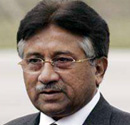
The history of political leadership in Pakistan is mired with coups, killings or bloodshed whereby regime change has been actualised. This has actually been a general trend in Pakistan, as the nation had experienced a very unstable political climate since independence. This kind of political scenario has given birth to many ills, prominent being the rise of militant organisations. And now that Pervez Musharraf is out of the scene and a coalition government is in power, it is highly unlikely that things will improve much, as the very basics of polity is plagued with party politics and army interventions.
What has happened to Pervez Musharraf was inevitable, sooner or later since he had staged one of the biggest military coups to kick Nawaz Sharif out from power in 1999, put him in exile in Saudi Arabia. But since last year, scenario has changed to the worse for Musharraf. Time has taken a very sweet revenge upon him as the idea has boomeranged. This time he is isolated. With an elected government in power, Pervez Musharraf is compelled to relinquish power. In recent times, his popularity touched the lowest ebb due to his policy with the US. While the citizens did not like close association with the US, Musharraf received pat on his back from his bosses in Washington.
For 30 years, in fact, Pakistan has been embroiled with military coups, assassinations and blood bath due to proliferation of militant outfits. Remember General Zia-ul-Haq, who had usurped power from late Zulfiqar Ali Bhutto, the father of Benazir Bhutto and manipulated his execution in one of the most ambiguous judicial trial in Pakistan. In 1977, Zia-ul-Haq staged a military coup d'état to overthrow Bhutto’s government and imposed martial law. With US backing, General Zia ruled for about 11 years, before he died in a plane crash on August 17, 1988. The manner of his death has given rise to many conspiracy theories.
However, it was General Ayub Khan, who initiated military rule in Pakistan in 1958 in a bloodless coup and went on to rule the country for the next 11 years. But war of 1965 with India led to a belief in Pakistan that General Ayub Khan betrayed the cause of Kashmir and he was forced to resign. He was replaced by the army chief of staff, Yahya Khan in 1969, another ruthless dictator. Yahya Khan presided over the disastrous 1971 War. So, the period between 1971 and 1977, Pakistan witnessed democratic government led by Zulfiqar Ali Bhutto. Musharraf is perhaps the last of dictators, who left the Pakistan’s political scene on a sad note.
So, what will be the immediate fallout? Will there be any change in Pakistan’s policy towards India? And will the country see peace and stability?
Well, the Pakistani ruling class, particularly the coalition government may feel at ease at the silent exit of Musharraf, but his departure does not give the world the guarantee that things will improve in Pakistan. Neither its policies vis-à-vis India, especially its stand on J&K, as is clear with recent statements of its leaders. Instead, there is likely chance of religious zealots taking the centre stage if the mainstream political parties do not work according to the aspirations of the masses. There may be another, like Musharraf, army general who can take advantage of weak political environment and stage a coup. Given the role of the military in Pakistan, there will be surprise if such a thing happens in months to come. Many will now blame Musharraf for all the ills in Pakistan but the army must also take some of the blame, although the military in that country is a holy cow that is beyond criticism.
Another issue that is critical is relation with India. Pakistan as a nation has been bent on harping on Kashmir issue, and like in any other country, its leaders have played Kashmir card smartly to stay in power. This coalition though working in the meantime, do have different ideological goals, one of which has been to oust Musharraf, and since the dictator is out of the scene, the basic differences may gain ground. This may lead to an unstable political condition, paving the way for yet another military coup.
Musharraf’s exit may be a victory for democracy, but democracy itself is at the razor edge in Pakistan.
|
|
Read More: Ali


Comments: